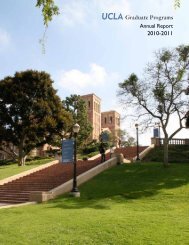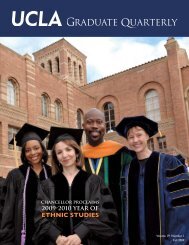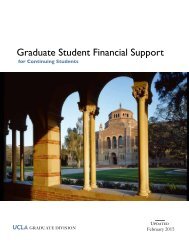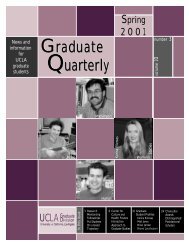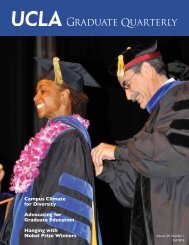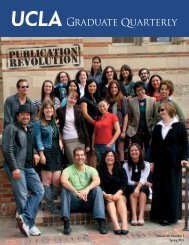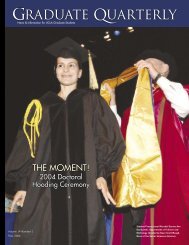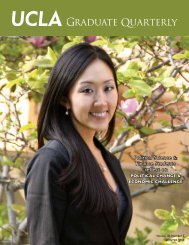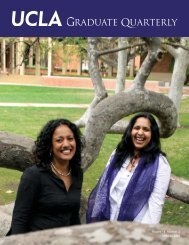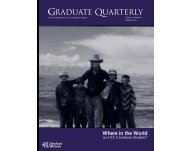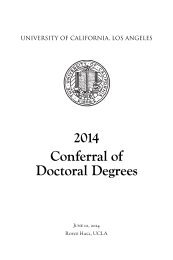Graduate Quarterly - Winter 2008 - UCLA Graduate Division
Graduate Quarterly - Winter 2008 - UCLA Graduate Division
Graduate Quarterly - Winter 2008 - UCLA Graduate Division
Create successful ePaper yourself
Turn your PDF publications into a flip-book with our unique Google optimized e-Paper software.
Carolina Sitnisky<br />
Spanish and Portuguese<br />
SOME LANGUAGE TEACHERS<br />
might consider it enough of a<br />
challenge to have their students<br />
learn that the English potato is<br />
patata in Spain. Carolina Sitnisky wants<br />
them to know, as well, that the word is<br />
papa in Latin America. Or that if they’re<br />
seeking public transportation, it’s an autobus<br />
in much of Latin America but a colectivo in<br />
the most southern regions and a guagua in<br />
Central America.<br />
During nearly a decade of traveling<br />
around Latin America as part of her work<br />
for an entertainment company, Carolina<br />
tried to identify some sort of generic Spanish<br />
that could be used in all corporate communications.<br />
“Of course, this search was<br />
unsuccessful,” she says. “There is no one way<br />
of simplifying the linguistic, ethnic, and<br />
cultural differences of the Latin American<br />
communities.” She thinks it’s important to<br />
communicate this diversity to her students<br />
in Spanish language and literature courses,<br />
and they seem to appreciate the level of expertise<br />
she brings to her work. “She remains<br />
one of my most memorable instructors,” one<br />
student says, “because in addition to her inherent<br />
understanding of the subject matter<br />
and classroom teaching expertise, she also<br />
fostered an environment where students felt<br />
comfortable and empowered to learn.”<br />
When Carolina finished her own undergraduate<br />
studies at the University of Buenos<br />
Aires, there were few opportunities to teach<br />
at the university level, so she pursued an<br />
interest in cinema and film with production<br />
and then marketing work. About the time<br />
that Fox Television offered her a position<br />
in Los Angeles, she had taken a couple of<br />
part-time university teaching assignments<br />
and was wondering “how I could go back<br />
to my first love.”<br />
So not long after the “leap of faith” that<br />
brought her to Los Angeles, another leap<br />
landed her in graduate studies at <strong>UCLA</strong>,<br />
where she was soon at the front of the class<br />
again as a teaching assistant. She also helped<br />
to update composition topics for the firstyear<br />
languages, to create supplementary<br />
materials for second-year language classes,<br />
and to mentor less experienced TAs in her<br />
department. “She has distinguished herself<br />
both academically and as a teacher,” says<br />
Professor John Dagenais, chair of the Department<br />
of Spanish and Portuguese.<br />
Out of the classroom this year to work<br />
on her dissertation comparing 1960s and<br />
1990s cinema and literature in Peru, Bolivia,<br />
and Ecuador, Carolina finds herself<br />
“missing teaching so much.” One of her<br />
greatest rewards, she says, is seeing her<br />
students—often underclassmen filling a<br />
language requirement—go on to major<br />
in Spanish, travel abroad, or even undertake<br />
graduate work themselves, she says.<br />
“I feel that perhaps my involvement has<br />
helped them discover something new<br />
about themselves.”<br />
<strong>Winter</strong> <strong>2008</strong> GRADUATE QUARTERLY<br />
17




